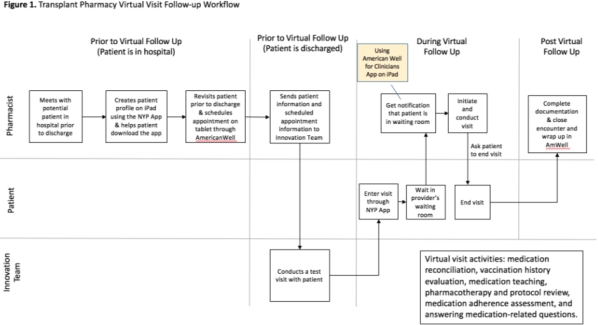Telemedicine Implementation in Organ Transplantation at a Metropolitan Academic Medical Center
Columbia University / NewYork-Presbyterian Hospital, New York.
Meeting: 2018 American Transplant Congress
Abstract number: A384
Keywords: Kidney transplantation
Session Information
Session Name: Poster Session A: Quality Assurance Process Improvement
Session Type: Poster Session
Date: Saturday, June 2, 2018
Session Time: 5:30pm-7:30pm
 Presentation Time: 5:30pm-7:30pm
Presentation Time: 5:30pm-7:30pm
Location: Hall 4EF
Transplant patients represent a complex patient population for which telemedicine may enhance patient access to the healthcare team, patient engagement, patient satisfaction and improved outcomes after transplantation.
Methods: Single-center, retrospective analysis of a pharmacy telemedicine implementation among kidney transplant patients. 
Results: Of the 55 patients approached to participate (Jan-Jun 2017) 84% were registered for a visit (recipients n=32 and living donors n= 14). Lack of appropriate technology n=6 and language barrier n=3 were barriers to participation. Most patients (75%) completed a virtual visit using a mobile device while the remainder used a computer. Population demographics: male (63%), mean age 47±13 yrs, and mean distance to hospital was 27 miles from the transplant center. Interim analysis after 18 patients indicated that 55% were “no shows.” In response, enhancements to the telemedicine platform and workflow were implemented (calendar invites with a 1-hr reminder and test visits 1 day prior to the clinician visit). Enhancements reduced “no shows” by 7%. Time from hospital discharge to the telemedicine visit was 5.4 days. While not significantly different, the time to a scheduled visit for patients with a successful visit versus those who were no shows was 4.5 versus 6.4 days, respectively (p= 0.28). Average visit duration was 12±8 minutes. Medication reconciliation was performed for 24 patients where six patients (25%) required adjustment to their medication list. Mean number of medication changes updated in the medical record were 1.2±0.4. All patients were educated about the importance of vaccines and about their discharge medication regimens and responded favorably to medication adherence questions.
Conclusion: Integrating a novel approach to healthcare delivery in a population of transplant recipients and living donors has revolutionized our practice model. This technology and practice model enhancement has enabled us to provide pharmacy services in the continuum of care as patient's transition from the hospital to home setting.
CITATION INFORMATION: Tsapepas D., Li H., Kohlberg D., Watts B., Monteiro J., Monteiro A., Jandovitz N. Telemedicine Implementation in Organ Transplantation at a Metropolitan Academic Medical Center Am J Transplant. 2017;17 (suppl 3).
To cite this abstract in AMA style:
Tsapepas D, Li H, Kohlberg D, Watts B, Monteiro J, Monteiro A, Jandovitz N. Telemedicine Implementation in Organ Transplantation at a Metropolitan Academic Medical Center [abstract]. https://atcmeetingabstracts.com/abstract/telemedicine-implementation-in-organ-transplantation-at-a-metropolitan-academic-medical-center/. Accessed July 6, 2025.« Back to 2018 American Transplant Congress
